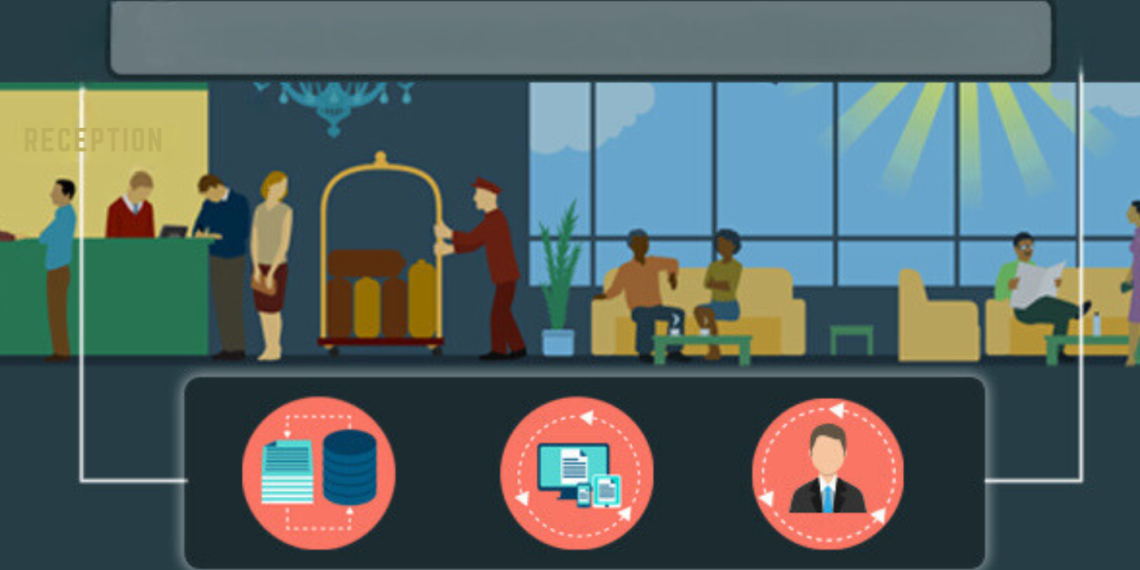The hospitality industry is a dynamic realm that has witnessed remarkable transformations over the centuries. From the modest inns that offered weary travelers a respite to the grand and diverse accommodations of today, this sector has evolved in response to changing consumer demands and global trends.
Within the dynamic realm of evolving hospitality, success demands not only adaptability but a commitment to innovation and excellence
As we stand on the threshold of the 21st century, the hospitality industry is once again at the cusp of transformation, with exciting opportunities and unique challenges on the horizon. In this article, we delve into the evolving landscape of hospitality and present 12 outstanding strategies that can pave the way for enduring success in this ever-changing world.
The Evolution of the Hotel Industry

The hotel industry has undergone a remarkable transformation throughout the centuries, evolving from humble inns to the luxurious resorts and diverse accommodations we see today. This journey through history sheds light on the remarkable changes and growth within the hospitality sector.
Early History
In the earliest days, the precursor to hotels was the simple inn. These inns provided essential accommodation and sustenance for weary travelers. Often strategically positioned along major trade routes, they served as welcome resting spots, offering respite and nourishment.
As time progressed, the 18th century saw the emergence of more sophisticated establishments that were precursors to modern hotels. These hotels provided improved accommodations, dining options, and various services. Typically situated in major cities, they catered to the more affluent travelers and businesspeople of the era.
19th and 20th Centuries
The 19th and 20th centuries marked a significant shift toward the modern hotel industry. During this period, hotels became more specialized, with some tailored to specific types of travelers, including business travelers, leisure seekers, and families. Services extended beyond mere lodging to include amenities such as spas, fitness centers, and restaurants.
Additionally, the 20th century brought about the rise of hotel chains. These are groups of hotels united under a common brand and operating standards. Hotel chains offered advantages such as consistency, convenience, and loyalty programs for consumers.
21st Century
The hotel industry continues to evolve in the 21st century. One of the most prominent trends is the emergence of the sharing economy. Platforms like Airbnb and Vrbo enable individuals to rent out their homes and apartments to travelers. While this creates new competition for traditional hotels, it also presents entrepreneurial opportunities within the hospitality sector.
Sustainability has become another focal point in the industry. Hotels are increasingly committed to reducing their environmental footprint and adopting sustainable practices. Efforts include energy conservation, the use of renewable energy sources, and the sourcing of local and sustainable food.
The Future of the Hotel Industry
The future of the hotel industry appears promising. Global travel demand is expected to continue its upward trajectory, driving the need for accommodations. Hotels that can adapt to evolving traveler preferences and embrace emerging technologies are poised for success in the coming years.
Several key trends are expected to shape the future of the hotel industry:
- Increased Personalization: Technology will be harnessed to provide a personalized guest experience, from streamlined check-ins using facial recognition to AI-driven recommendations for activities and amenities. Voice-activated assistants will enable guests to control room functions effortlessly.
- Focus on Sustainability: The commitment to sustainability will persist, with hotels seeking to reduce their environmental impact. Efforts will include adopting renewable energy sources, reducing food waste, and utilizing sustainable building materials.
- Rise of Wellness Tourism: Wellness tourism is on the ascent, and hotels are responding by offering a spectrum of wellness-related products and services. These may encompass spa treatments, fitness classes, and health-conscious food options.
- Growth of the Sharing Economy: The sharing economy continues to expand, impacting the hotel industry. To counter this competition, hotels are introducing more flexible booking options and forming partnerships with sharing economy platforms.
The hotel industry is characterized by dynamism and change. By aligning with the shifting needs of travelers and embracing technological innovations, hotels can continue to thrive and meet the demands of the ever-evolving hospitality landscape. The future holds ample opportunities for growth, innovation, and excellence within the industry.
12 Strategies for Success in Evolving Hospitality
As the hospitality industry evolves in response to shifting consumer preferences and global trends, staying ahead of the curve has never been more vital. In this section, we present 12 outstanding strategies that will serve as your trusted companions in the ever-changing landscape of hospitality. These strategies encompass personalization, sustainability, wellness, and technological advancements, all designed to help you not only adapt but excel in the evolving world of hospitality. Let’s embark on this journey to secure lasting success and elevate the guest experience to new heights.
1. Embrace Technological Innovations
Technology plays a pivotal role in the modern hospitality landscape. Embrace emerging technologies and integrate them seamlessly into your operations to provide a convenient, streamlined, and personalized guest experience. Online booking platforms, mobile check-ins, and AI-powered chatbots are just a few examples of how technology can enhance customer interactions and improve operational efficiency.
2. Leverage Data Analytics
Data analytics can provide valuable insights into customer behaviour, preferences, and trends. Utilize data to understand guest patterns and tailor your offerings, marketing campaigns, and operational strategies accordingly. By leveraging data analytics, you can make informed decisions and anticipate the evolving needs of your target audience.
3. Focus on Personalization

In the evolving hospitality landscape, it has become crucial for businesses to adapt and meet the changing demands of today’s guests. These guests are no longer satisfied with generic experiences; instead, they seek personalized interactions that cater to their unique needs and preferences. By making guests feel valued and understood, you can set yourself apart from competitors.”
4. Enhance the Mobile Experience
Mobile devices have become an integral part of travellers’ lives. Invest in a user-friendly mobile app or a mobile-responsive website that allows guests to make reservations, access information, request services, and provide feedback effortlessly. By optimizing the mobile experience, you can engage with guests throughout their journey, from pre-booking to post-stay, fostering loyalty and positive reviews.
5. Prioritize Sustainability
Sustainability is no longer just a trend; it’s a key consideration for travellers. Embrace eco-friendly practices such as energy-efficient systems, waste reduction, locally sourced products, and community engagement initiatives. Communicate your sustainability efforts to attract eco-conscious guests and differentiate your business in the competitive market.
6. Embrace Influencer Marketing
Social media influencers have a significant impact on travel decisions. Collaborate with influencers who align with your brand values and target audience to amplify your reach and generate buzz. Through captivating content and authentic experiences, influencers can help promote your property and increase bookings. and help you in evolving hospitality.
7. Stay Agile and Flexible

Flexibility is crucial in the ever-changing hospitality landscape. Monitor industry trends, listen to customer feedback, and adapt your offerings accordingly. Embrace a culture of agility and continually refine your services, amenities, and operational strategies to meet evolving hospitality demands.
8. Foster a Positive Work Culture
A happy and motivated workforce is essential for delivering exceptional evolving hospitality experiences. Invest in employee training and development programs, promote work-life balance, and foster a supportive work environment. Engaged employees will go the extra mile to provide outstanding service, leading to increased customer satisfaction and repeat business.
9. Collaborate with Local Partners

Forge partnerships with local businesses and organizations to create unique experiences for your guests. Collaborate with tour operators, restaurants, cultural institutions, and local suppliers to offer exclusive packages and immersive experiences that showcase the destination’s authentic offerings.
10. Embrace Online Reputation Management
Online reviews and ratings heavily influence travellers’ decision-making processes. Implement a robust online reputation management strategy to monitor and respond to guest reviews promptly. Encourage satisfied guests to share their experiences, and address negative feedback with empathy and professionalism, demonstrating your commitment to guest satisfaction.
11. Invest in Staff Training

Delivering exceptional service requires well-trained staff members who possess industry knowledge and excellent interpersonal skills. Invest in ongoing training programs to empower your employees to deliver personalized, memorable experiences that set your business apart from competitors.
12. Evolving Hospitality: Anticipate Future Trends
To remain competitive in the evolving hospitality landscape, it’s essential to anticipate and adapt to emerging trends. Stay informed about industry developments, attend conferences, and engage with industry experts to gain insights into upcoming trends and technologies that can shape the future of the industry.
Conclusion
Evolving hospitality, and staying competitive requires a proactive approach to adapt to changing customer expectations and market trends. By embracing technological innovations, prioritizing personalization, fostering sustainability, and focusing on guest satisfaction, hospitality businesses can thrive in this dynamic landscape. By continuously evolving hospitality and embracing new strategies, hospitality professionals can ensure their place at the forefront of the industry, providing exceptional experiences that keep guests coming back for more.





















